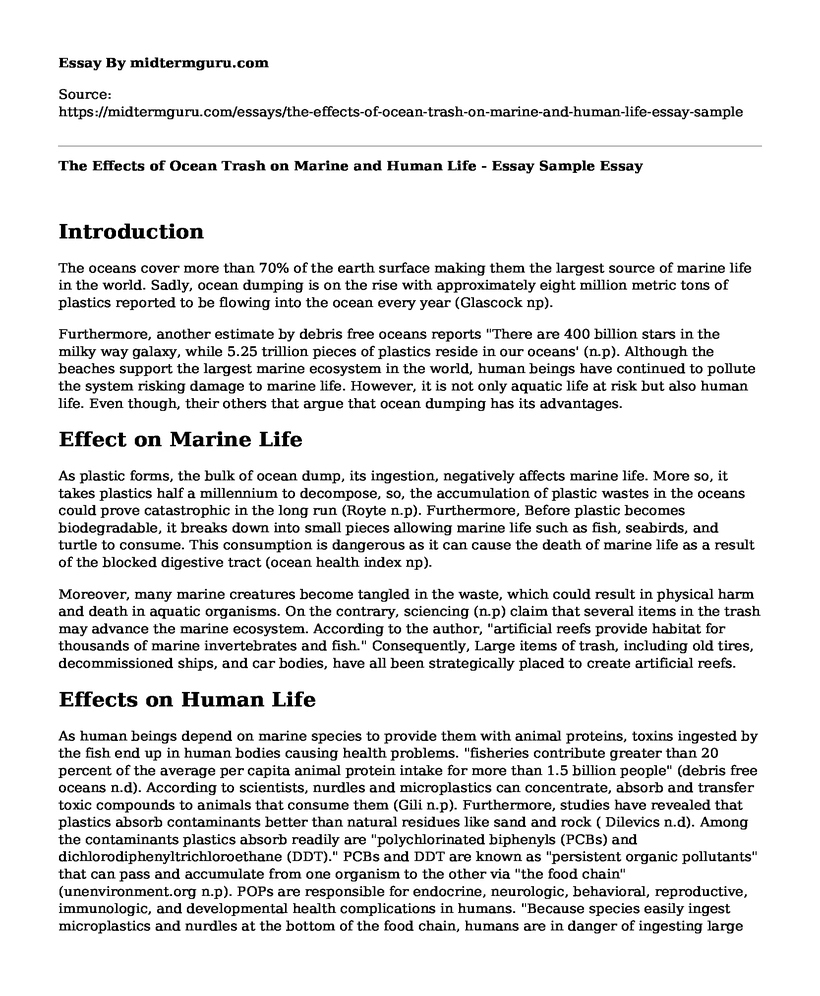Introduction
The oceans cover more than 70% of the earth surface making them the largest source of marine life in the world. Sadly, ocean dumping is on the rise with approximately eight million metric tons of plastics reported to be flowing into the ocean every year (Glascock np).
Furthermore, another estimate by debris free oceans reports "There are 400 billion stars in the milky way galaxy, while 5.25 trillion pieces of plastics reside in our oceans' (n.p). Although the beaches support the largest marine ecosystem in the world, human beings have continued to pollute the system risking damage to marine life. However, it is not only aquatic life at risk but also human life. Even though, their others that argue that ocean dumping has its advantages.
Effect on Marine Life
As plastic forms, the bulk of ocean dump, its ingestion, negatively affects marine life. More so, it takes plastics half a millennium to decompose, so, the accumulation of plastic wastes in the oceans could prove catastrophic in the long run (Royte n.p). Furthermore, Before plastic becomes biodegradable, it breaks down into small pieces allowing marine life such as fish, seabirds, and turtle to consume. This consumption is dangerous as it can cause the death of marine life as a result of the blocked digestive tract (ocean health index np).
Moreover, many marine creatures become tangled in the waste, which could result in physical harm and death in aquatic organisms. On the contrary, sciencing (n.p) claim that several items in the trash may advance the marine ecosystem. According to the author, "artificial reefs provide habitat for thousands of marine invertebrates and fish." Consequently, Large items of trash, including old tires, decommissioned ships, and car bodies, have all been strategically placed to create artificial reefs.
Effects on Human Life
As human beings depend on marine species to provide them with animal proteins, toxins ingested by the fish end up in human bodies causing health problems. "fisheries contribute greater than 20 percent of the average per capita animal protein intake for more than 1.5 billion people" (debris free oceans n.d). According to scientists, nurdles and microplastics can concentrate, absorb and transfer toxic compounds to animals that consume them (Gili n.p). Furthermore, studies have revealed that plastics absorb contaminants better than natural residues like sand and rock ( Dilevics n.d). Among the contaminants plastics absorb readily are "polychlorinated biphenyls (PCBs) and dichlorodiphenyltrichloroethane (DDT)." PCBs and DDT are known as "persistent organic pollutants" that can pass and accumulate from one organism to the other via "the food chain" (unenvironment.org n.p). POPs are responsible for endocrine, neurologic, behavioral, reproductive, immunologic, and developmental health complications in humans. "Because species easily ingest microplastics and nurdles at the bottom of the food chain, humans are in danger of ingesting large quantities of POPs when consuming larger species, like tuna and wahoo" (Andrews n.p). On the other hand, Sciencing (np) claims the key reason businesses and people dump their trash in water bodies is because there are no landfill fees, and little bureaucracy making it easy and cheap. Another reason is that oceans cannot be regulated and thus it would be hard for anyone to get caught.
Conclusion
In conclusion, the oceans are vital for the survival of marine and human life. They provide habitat to countless marine species, and they also provide food and economic activities to humans. That is why ocean dumping is a significant issue that affects both marine organisms and human beings. Polluting the oceans with millions of tons of plastic every year goes to harm and kill marine life. As a result of this also affects the humans as they ingest life-threatening toxins from the aquatic organisms.
Works Cited
Andrews, G. Plastics in the Ocean Affecting Human Health. 2018. Website. 26th November 2018. < https://serc.carleton.edu/NAGTWorkshops/health/case_studies/plastics.html>
DebrisFreeOceans. Org. Marine debris hurts human health and marine life, and South Florida's economy. 2018. Website, 26th November 2018. < http://debrisfreeoceans.org/marine-debris>
Dilevics, A. How Ocean Pollution Affects Humans. 24th March 2016. Website. 26th November 2018 <http://www.planetaid.org/blog/how-ocean-pollution-affects-humans>
Gili, E. Is Marine Plastic Pollution a Threat to Human Health? 8th June 2017. Website. 26th November 2018https://www.dw.com/en/is-marine-plastic-pollution-a-threat-to-human-health/a-39161868
Glascock, T. The problem of ocean trash. 2016, website. 26th November 2018
< https://oceanconservancy.org/blog/2016/08/22/the-problem-of-ocean-trash/>
Ocean Index Health. Trash Pollution. 7 November 2014. Website. 26th November 2018. http://www.oceanhealthindex.org/methodology/components/trash-pollution.
Royte, E. We Know Plastic Is Harming Marine Life. What About Us? 2018. Website. 26th November 2018. <://www.nationalgeographic.com/magazine/2018/06/plastic-planet-health-pollution-waste-microplastics/>
Wilson, J. Advantages and Disadvantages of Ocean Dumping. 24th April 2018. Website. 26th November 2018 < https://sciencing.com/advantages-disadvantages-ocean-dumping-8166298.html>
Cite this page
The Effects of Ocean Trash on Marine and Human Life - Essay Sample. (2022, Oct 24). Retrieved from https://midtermguru.com/essays/the-effects-of-ocean-trash-on-marine-and-human-life-essay-sample
If you are the original author of this essay and no longer wish to have it published on the midtermguru.com website, please click below to request its removal:
- Essay on Ocean Acidification
- Essay on BPs Oil Spill
- Air Pollution in the World and Its Effects - Essay Example
- Article Analysis Essay on Effects of Glaciation
- Technology: Biggest Threat to Our Environment? - Essay Sample
- Auburn: Reducing Paper Waste for Environmental Sustainability - Essay Sample
- Rainwater Pollution: Assessing Acidic Levels Beyond PH=7 - Research Paper







